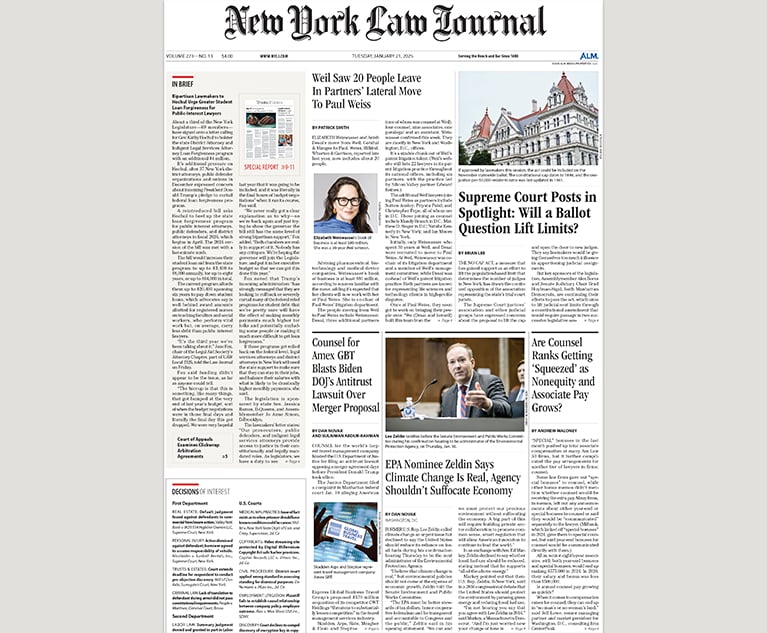Creative Uses of Social Media in Litigation
In his State E-Discovery column, Mark A. Berman discusses recent decisions which make clear that counsel needs to be creative and “think outside of the box” as to how to effectively utilize social media.
November 05, 2018 at 02:40 PM
7 minute read
 Mark A. Berman
Mark A. Berman
Social media evidence is not only about using it in a personal injury action to impeach the injured party's testimony as to what caused the accident or his or injuries; it can be used by defendants against the “poster” in many other types of litigations. As the recent decisions discussed below make clear, counsel simply needs to be creative and “think outside of the box” as to how to effectively utilize social media. Social media is also frequently the basis for defamation claims, and where public posts go too far, as in Carey v. Ripp, 2018 NYLJ LEXIS 2405 (Sup. Ct. Nassau Co. July 16, 2018), a court may order the destruction, deletion and/or removal of defamatory information in defendant's possession, custody and control, including posts on defendant's Facebook page.
In landlord-tenant proceedings, where the issue may be whether the person lived in an apartment during a certain period of time, social media evidence has been ordered to be produced in redacted form to the extent it identifies where a person is living, which electronically stored information might include critical geo-locational meta data. Similarly, in a Labor Law case, where the issue was which defendant entity was entitled to summary judgment, the injured worker's social media post which identified plaintiff's location and what piece of equipment was used proved important evidence on summary judgment. Social media evidence can also be critical in breach of restrictive covenant cases.
Social media evidence must be requested where there is a need to demonstrate evidence of other employee's use of social media. In a recent discrimination case, Emmanuel v. Cushman & Wakefield, 2018 N.Y. Misc. LEXIS 3738, 2018 NY Slip Op 32135(U) (Sup. Ct. N.Y. Co. Aug. 27, 2018), where the claim was that similarly situated non-pregnant co-workers allegedly were not disciplined for posting on Facebook during business hours, the court rejected such claim where “there was no evidence of comparators to the plaintiff being treated differently.”
Location Evidence
In a licensee holdover proceeding, the court in Renaissance Equity Holdings v. Webber, 2018 N.Y. Misc. LEXIS 3260, 2018 NY Slip Op 28241 (Civ. Ct. Kings Co. July 27, 2018), ordered the production of certain social media relevant to proving or disproving respondent's defense that she primarily resided with her deceased's relative at the premises for at least two years and petitioner's claim that respondent had permanently vacated the apartment. As such, the court ordered that respondent produce all online posts, whether in her legal name, Benze Lohan, or any other aliases, on social media including, but not limited to, Instagram, Twitter, YouTube and Facebook under the following conditions:
(a) if the post contains a location and date, then respondent shall redact all content, including photographs and third-party statements, except for the location and date stated on the post;
(b) if the post contains any comment or statement made by respondent in which she states a location, then respondent shall redact only the photograph contained within the post; and
(c) if the post contains a comment or statement made by respondent which contains the word “home,” “house,” “apartment” or any other synonym of the word “residence,” then the entire content of the post shall be produced with no redaction.
Similarly, in 3212-16 Decatur Realty v. Hernandez, 2018 N.Y. Misc. LEXIS 4224, 2018 NY Slip Op 51367(U) (Civ. Ct. Bronx Co. Sept. 25, 2018), a holdover proceeding predicated on the claim that the respondents sublet and/or assigned their rent stabilized apartment in violation of their lease, the landlord used a Facebook post of one respondent to demonstrate that respondent had left the apartment and moved to another state.
In Banegas v. RSL Bowling, 2018 N.Y. Misc. LEXIS 2970, 2018 NY Slip Op 31606(U) (Sup. Ct. N.Y. Co. July 9, 2018), a Labor Law case, defendant moved for summary judgment and its counsel had attached to its reply papers copies of plaintiff's Facebook page posts from the day of the accident. The post was a photo of a circuit board and a caption stating “this is where we were working at the time con Edison [sic] turn[ed] on power without notification.” The court relied on such post in its decision where plaintiff did not submit an “affidavit describing how the accident occurred, where he was in the basement at the time of the accident, and what equipment he was working on at the time of the accident, despite the fact that it appears from his social media posts, that plaintiff knew exactly what equipment he was operating at the time of the accident.”
Breach of Restrictive Covenant Evidence
In Matter of RevitaLife Therapy v. Petersel, 2018 N.Y. Misc. LEXIS 3123, 2018 NY Slip Op 31693(U) (Sup. Ct. N.Y. Co. July 20, 2018), plaintiff sought a preliminary injunction enjoining defendant during the pendency of an arbitration from violating the restrictive covenants contained in the parties' agreement, and supported such application with a screen shot from a Facebook therapist group community page which showed defendant soliciting therapists for her company and with testimony that every person in this Facebook group is important to plaintiff's business as referrals.
Discrimination Evidence
In Emmanuel, plaintiff alleged that defendants were liable to her for discrimination on the basis of sex and disability, and that the defendants retaliated against her and created a hostile work environment. Plaintiff received a warning that her employer had “received a report of an insulting nature that you posted on a social networking site during work hours” and that company policy prohibited “participation in social networking during business hours, unless there is a specific definable business function associated with such participation.” Plaintiff had posted to her Facebook page that “[t]he day my pregnancy was announced ppl at my job started to try and make my life a living hell. They don't realize it's a mission impossible. Thanks Jesus.” The posting also complained that “[o]ld bitter ppl with no education, no kids, no man, no lives, no future are a joke!!” and that “[w]hen ppl at work try to make your job harder than it needs to be, just countdown till your blessed to no longer be there. 142 days left.” The court ultimately dismissed the complaint on collateral estoppel grounds and, in relying upon such prior decision, it rejected the claim that “similarly situated non-pregnant co-workers were not disciplined for posting on Facebook during business hours” as “there was no evidence of comparators to the plaintiff being treated differently, collateral estoppel precludes these claims.”
Defamation Evidence
In Carey, a defamation action, the court stated that this case is an “illustration of the modern phenomena of the abuse and limits of the Constitutional right to freedom of speech in the context of narcissistic defamatory statements, fueled by the ease of public dissemination and compulsive amplification to the world, of unfiltered, angry thoughts and feelings in spaces created by ubiquitous social media such as Facebook.” The motion court granted plaintiff's preliminary injunction: (1) enjoining defendant from any further dissemination of defamatory information about the plaintiff, and (2) directing the destruction, deletion and/or removal of any defamatory information in defendant's possession, custody and control, including two posts on defendant's Facebook page containing defamatory information regarding the plaintiff.
Mark A. Berman is a partner at Ganfer Shore Leeds & Zauderer and chair of the New York State Bar Association's Committee on Technology and the Legal Profession.
This content has been archived. It is available through our partners, LexisNexis® and Bloomberg Law.
To view this content, please continue to their sites.
Not a Lexis Subscriber?
Subscribe Now
Not a Bloomberg Law Subscriber?
Subscribe Now
NOT FOR REPRINT
© 2025 ALM Global, LLC, All Rights Reserved. Request academic re-use from www.copyright.com. All other uses, submit a request to [email protected]. For more information visit Asset & Logo Licensing.
You Might Like
View All
Neighboring States Have Either Passed or Proposed Climate Superfund Laws—Is Pennsylvania Next?
7 minute read
Trending Stories
- 1How ‘Bilateral Tapping’ Can Help with Stress and Anxiety
- 2How Law Firms Can Make Business Services a Performance Champion
- 3'Digital Mindset': Hogan Lovells' New Global Managing Partner for Digitalization
- 4Silk Road Founder Ross Ulbricht Has New York Sentence Pardoned by Trump
- 5Settlement Allows Spouses of U.S. Citizens to Reopen Removal Proceedings
Who Got The Work
J. Brugh Lower of Gibbons has entered an appearance for industrial equipment supplier Devco Corporation in a pending trademark infringement lawsuit. The suit, accusing the defendant of selling knock-off Graco products, was filed Dec. 18 in New Jersey District Court by Rivkin Radler on behalf of Graco Inc. and Graco Minnesota. The case, assigned to U.S. District Judge Zahid N. Quraishi, is 3:24-cv-11294, Graco Inc. et al v. Devco Corporation.
Who Got The Work
Rebecca Maller-Stein and Kent A. Yalowitz of Arnold & Porter Kaye Scholer have entered their appearances for Hanaco Venture Capital and its executives, Lior Prosor and David Frankel, in a pending securities lawsuit. The action, filed on Dec. 24 in New York Southern District Court by Zell, Aron & Co. on behalf of Goldeneye Advisors, accuses the defendants of negligently and fraudulently managing the plaintiff's $1 million investment. The case, assigned to U.S. District Judge Vernon S. Broderick, is 1:24-cv-09918, Goldeneye Advisors, LLC v. Hanaco Venture Capital, Ltd. et al.
Who Got The Work
Attorneys from A&O Shearman has stepped in as defense counsel for Toronto-Dominion Bank and other defendants in a pending securities class action. The suit, filed Dec. 11 in New York Southern District Court by Bleichmar Fonti & Auld, accuses the defendants of concealing the bank's 'pervasive' deficiencies in regards to its compliance with the Bank Secrecy Act and the quality of its anti-money laundering controls. The case, assigned to U.S. District Judge Arun Subramanian, is 1:24-cv-09445, Gonzalez v. The Toronto-Dominion Bank et al.
Who Got The Work
Crown Castle International, a Pennsylvania company providing shared communications infrastructure, has turned to Luke D. Wolf of Gordon Rees Scully Mansukhani to fend off a pending breach-of-contract lawsuit. The court action, filed Nov. 25 in Michigan Eastern District Court by Hooper Hathaway PC on behalf of The Town Residences LLC, accuses Crown Castle of failing to transfer approximately $30,000 in utility payments from T-Mobile in breach of a roof-top lease and assignment agreement. The case, assigned to U.S. District Judge Susan K. Declercq, is 2:24-cv-13131, The Town Residences LLC v. T-Mobile US, Inc. et al.
Who Got The Work
Wilfred P. Coronato and Daniel M. Schwartz of McCarter & English have stepped in as defense counsel to Electrolux Home Products Inc. in a pending product liability lawsuit. The court action, filed Nov. 26 in New York Eastern District Court by Poulos Lopiccolo PC and Nagel Rice LLP on behalf of David Stern, alleges that the defendant's refrigerators’ drawers and shelving repeatedly break and fall apart within months after purchase. The case, assigned to U.S. District Judge Joan M. Azrack, is 2:24-cv-08204, Stern v. Electrolux Home Products, Inc.
Featured Firms
Law Offices of Gary Martin Hays & Associates, P.C.
(470) 294-1674
Law Offices of Mark E. Salomone
(857) 444-6468
Smith & Hassler
(713) 739-1250








